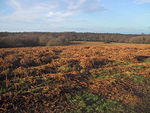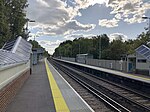Bethel Strict Baptist Chapel, Wivelsfield

Bethel Baptist Chapel is a Strict Baptist place of worship in the village of Wivelsfield in East Sussex, England. The cause was founded in 1763 by members of a chapel at nearby Ditchling; Henry Booker and other worshippers seceded and began to meet at Wivelsfield after hearing a sermon by George Whitefield. Although some members of the new church soon returned to the Ditchling congregation, the cause thrived under Booker's leadership, and the present chapel—a building of "quiet and unassuming elegance" set in its own graveyard—was erected in 1780. It has served the Strict Baptist community continuously since then, and members founded other chapels elsewhere in Sussex during the 18th and 19th centuries. The chapel is a Grade II Listed building.
Excerpt from the Wikipedia article Bethel Strict Baptist Chapel, Wivelsfield (License: CC BY-SA 3.0, Authors, Images).Bethel Strict Baptist Chapel, Wivelsfield
Pepper Close,
Geographical coordinates (GPS) Address Nearby Places Show on map
Geographical coordinates (GPS)
| Latitude | Longitude |
|---|---|
| N 50.9627 ° | E -0.0952 ° |
Address
Pepper Close
Pepper Close
RH15 0SJ , Wivelsfield
England, United Kingdom
Open on Google Maps









